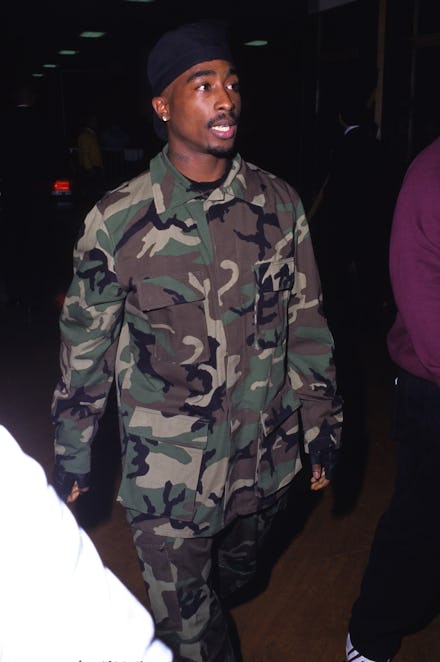This One Quote Sums Up Tupac’s Powerful and Complex Legacy Better Than Any Other

Tupac Shakur believed hip-hop was a true art form at a time when few did. He knew there was value in telling stories about the streets, but that they had to be told in the right way. He was hyper-conscious of the power of his lyrics and his influence as a cultural figure. And he wanted all rappers to be the same.
In one of the last interviews with Vibe magazine, published a year before his murder, Tupac summed up the contributions he wished to leave hip-hop in nearly perfect prose.* And looking back today, on what would have been his 44th birthday, it seems that the change he wanted to see is coming to pass.
Responsibility. Though Tupac's songs were filled with drugs, violence and death, like so much mainstream hip-hop, he made a conscious effort to avoid glorifying these realities. He deemed it irresponsible when rappers "talk about murder and death and you don't talk about the pain or you talk about killing and robbing and stealing and you don't talk about jail and death and betrayal and all things that go with it," he told MTV in October 1995.
This philosophy seems to have taken hold with many of today's most resonant voices in hip-hop — none more so than Kendrick Lamar, who considered naming his most recent album 2 Pimp A Caterpillar (acronym: 2 P.A.C.) to honor the legend. Lamar resurrects Tupac for a reconstructed interview between the two rappers on the album's track "Mortal Man." And the whole album insists on the idea that the artist has a responsibility to uplift and inspire his community, while scrutinizing every emotional challenge and potential hypocrisy that comes with assuming such a monumental task.
The biggest hypocrite of 1995. Tupac struggled with the influence of his own complex and contradictory legacy his whole life. He postured himself as thug, but danced ballet while attending art school. He was a West Coast icon, but he was born and raised in New York, writing his first rap under the name MC New York. He wrote numerous songs with misogynistic lyrics, alongside some of the most empowering and tender feminist anthems the genre has ever heard — such as "Keep Ya Head Up" and "Dear Mama."
He wanted to be seen as "Thug Life" incarnate, but Tupac could not escape his sensitive side. When he was indicted for sexual abuse in 1993 (and sentenced in 1995), he asserted his innocence but later assumed responsibility for not preventing two other men from taking advantage of Ayanna Jackson. "[E]ven though I'm innocent of the charge they gave me, I'm not innocent in terms of the way I was acting," Tupac said in the same 1995 Vibe interview as above. "I'm just as guilty for not doing nothing as I am for doing things."
During his finest moments, he was one of the most lyrical and socially conscious MCs that rap has ever seen. His posthumously released "Changes" is one of his finest achievements in politically conscious rap — one that the Vatican even endorsed in 2009 when it was shared on their MySpace playlist. On the track, Tupac meditates on racism and the effects of poverty: "Cause both Black and White are smoking crack tonight / And the only time we chill is when we kill each other / It takes skill to be real, time to heal each other."
Tupac occasionally lost sight of this mission to uplift through his art. But he never lost it completely. Toward the end of his life when he got out of prison, he was spitting some of his most complex social and political meditations under a new name — Makaveli.
"This Thug Life stuff, it was just ignorance," Tupac reportedly told Vibe in that 1995 interview. "My intentions was always in the right place. So that's what I'm going to show them. I'm going to show people my true intentions, and my true heart. I'm going to show them the man that my mother raised. I'm going to make them all proud."
He didn't get much of a chance. But thankfully, the best parts of his legacy survive today.
*Note: The original interview is no longer available, and exact wording varies between reports. The language Mic uses here is true to the hyperlinked, reproduced version.